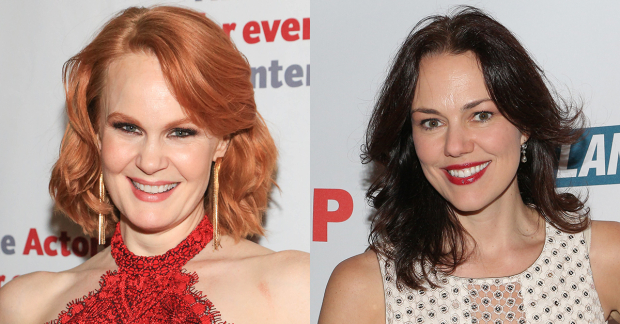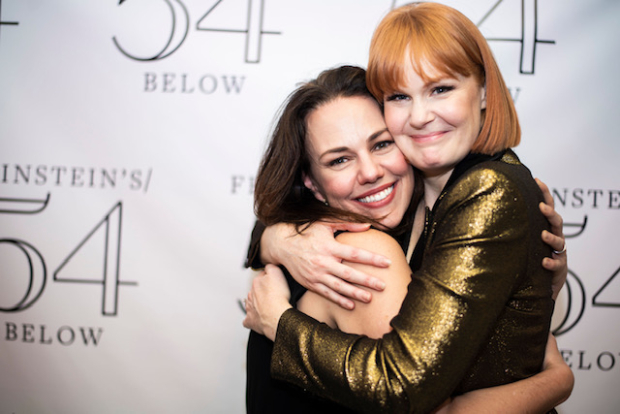Interview: Georgia Stitt and Kate Baldwin on Amplify 2021, Maestra Music, and the Future of Broadway
The lineup includes Ashley Park, Nikki M. James, Brandon Victor Dixon, Kenita Miller, Eva Noblezada, Reeve Carney, Bernadette Peters, and Anaïs Mitchell.
Being a first in any industry is tough. Seeing someone who shares your identities or looks like you can be a motivator to take action. Sure, that's inspiring, but creating genuine pathways to those roles begins with equal access to resources and opportunities. Composer, lyricist, and musical director Georgia Stitt understands firsthand the impact of access to opportunities and resources, which is why she started Maestra Music in 2017.
Maestra Music continues to drive this change as we witness an unprecedented demonstration of the force of people's power in the performing arts industry. On March 29, Maestra is hosting Amplify 2021, a virtual concert directed by Tony nominee Kate Baldwin. Hosted by Andréa Burns and Brooks Ashmanskas, the interactive experience will focus on the importance of collaboration and connection.
Ahead of the event, Stitt and Baldwin spoke with TheaterMania about Maestra's relevance, the importance of building community, and what brings them joy nowadays.

(© Tricia Baron/David Gordon)
Kate, how did you get involved as a director for Amplify 2021 and what part of the process have you found most fruitful?
Kate Baldwin: It came about because there was a call for social justice with the protests surrounding George Floyd's murder, so it got me thinking about how can I be a part of the change I'd like to see in the world.
Georgia isn't only my music director and composer of choice; she's one of my dearest friends. She invited me to be a part of the development committee at Maestra founded in September because I was curious about the nonprofit world. I consider the people who work in nonprofits superheroes! I was learning about their skill sets and how I could help. When we started talking about having a fundraiser for the spring, I thought to myself, "I know about fundraisers and have performed in many galas." Over the last year, many places I've worked with reached out to collaborate and I thought I could put something together based on what I had learned and the skills I already had. My skills are gathering people I know and love who will agree to be part of an event. When one of the people you reach out to is Bernadette Peters, and she sends a video, you know you're onto something special!
Maestra members will share their personal experiences and journeys to becoming the musicians they are today and how Maestra changed their lives. This event feels like an introduction to this group because the organization is still young and we now recognize that we can reach more people virtually.
Mentorship is at the core of Maestra's mission. Where have you found there needs to be more mentorship and do you think the conversation surrounding it has evolved?
Georgia Stitt: Everyone is a beginner at some point. We all come into our workspace and our job opportunities from different ways, and so everyone is constantly reinventing how you get to work, how you get to be an artist, how you get to make a living as an artist. Mentorship isn't limited to young people. It's for anyone new in the industry or already in the industry. We're finding that many professionals want to give back and make things easier for others, so they don't make the same mistakes they made or have the same difficulty. Mentorship doesn't have to be formalized except that you have to formalize it anytime you offer a program so that everyone's experiences are equitable, but you're really creating relationships where they seemed impossible before.
Kate: The mentorship program at Maestra is about 6 months old and has been incredibly valuable for the 30-plus partnerships formed out of the 70 applicants. I've been an actor for almost 24 years, and that kind of mentorship isn't as prevalent [compared to a corporate work environment]. It's almost taboo for an older, more experienced actor to tell a younger person what to do. That's the director's job. That's not to say collaboration doesn't exist, but an actor talking to another actor can only share what their personal experience has been. Suppose you were listening to somebody else's journey. In that case, there might be personal details you could apply to yourself, but it's also personal. Everybody has their path, and they're making it up as they go. There's no set way to create stories, but it's nice when I can talk with somebody who's 15 or 20 years older than me and they'll share their experiences.
Amplify 2021 comes at a time when the performing arts industry is in intermission and we must reimagine the pre-pandemic models. Why do you think organizations like Maestra are vital nowadays?
Georgia: Maestra has provided regular opportunities for people to connect and share work, ideas, and education; the mentorship program came out of that. We're marking one year of celebrating relationships, having new experiences, finding out new ways to connect. I'm calling Amplify 2021 a concert and community event because, in addition to just being a concert, this is an interactive community event where you log in you come into the venue and for the lobby. Then you can choose if you want to go hang out in the green room or the gallery and "run into people." What has been the focal point of Maestra's work this year is making sure that we stay connected as a community to come back to places where we can make music and write and tell stories.
Kate: It's an invitation to examine the way things were done before and make changes. As we look to the future, we need to build something more inclusive and representative of who we are. We've seen that over and over again, we've seen that in our nation. There's nothing like a performance going on in front of my very eyes, and nothing will ever replace it, but I understand now more than ever how vital it is to reach beyond who's in the room. You never know who you're going to reach, whose life will change; they will make a decision based on what they see us doing.
What do you think Broadway will gain by including more female-identifying, nonbinary, and TGNC voices as part of the norm?
Georgia: There's a danger of telling the same stories. If you're not the kind of person who fits into the norm, you don't belong. The more we're able to tap into the entire world of talents of young people or people entering the business who say they have a story to tell. Inevitably, the reason we love theater is that we saw some show or heard some song and connected with it. There are communities that don't get to have that experience. It's our job to make them feel welcome in the theater because theater should be for everybody.
Kate: As an actor, you determine what that person's point of view is on the world. You can go a million different ways to the character, but you have to zero in on their point of view. I think there's a point of view that has yet to be heard in a very powerful way, and I want to shine a light on those stories because that point of view adds richness to the human experience. Why not embrace all the parts of being human and introduce those points of view to the world?
What keeps you going, and is there any music that currently brings you joy?
Georgia: A lot of the music I listen to is work-related. It's an amazing thing to have gone through a year of a pandemic where you mostly live in an apartment with the same three people. Then you go into actual quarantine [Stitt is on location for a project] with those same people and realize they're your favorite people. I feel fortunate and grateful to have them around me.
Kate: I created a 30-minute playlist representative of the artists that Maestra supports. There's Rona Siddiqui, Grace McLean, Shaina Taub, and Lolo, so they're the ones running through my head. They're all unique and vital!

(© Kristin Pulido)








